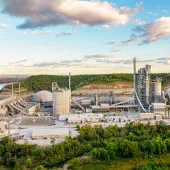Report confirms carbon costs harming the cement industry

Sector’s 2013 sustainable development report highlights the challenges facing the UK cement industry
MPA Cement has published its 2013 Sustainable Development (SD) report which highlights the challenges the cement industry faces in remaining competitive and contributing to a sustainable UK economy.
The report identifies UK-specific carbon costs being applied to the sector as a major burden and potential threat to the future of the industry, and calls on the UK Government to continue to fight for a level playing field that will allow the sector to compete against overseas suppliers and other competing construction materials.
Pal Chana, executive director of MPA Cement, commented: ‘The UK cement industry’s track record on carbon reduction is second to none and we were the first national cement sector trade association in the world to publish a 2050 Greenhouse Gas Reduction Strategy in February 2013. Yet a UK-only carbon price support tax that took effect in April 2013 will be applied in full to cement, whereas some competing construction materials will receive compensation from the Government for most of the extra costs that they will incur.
‘This is at a time when compensation is also being paid to those same industries for the indirect costs associated with the EU Emissions Trading System. This imbalance just adds to the cumulative cost burden that the cement industry has to bear and distorts fair competition.’
MPA Cement says European state aid rules currently prevent its members from being compensated against these externally imposed costs and that this is undermining the industry’s future economic sustainability.
Between 2014 and 2020, the UK cement industry faces £353 million of costs associated with carbon reduction, passed on in electricity prices, that many of its competitors will not have, putting domestically produced cement at an immediate disadvantage and threatening the future of this vital product.
Pal Chana (pictured) continued: ‘Britain needs an economically sustainable domestic cement industry in order to have a sustainable domestic economy and one that can compete globally. Maintaining the UK cement industry’s competitiveness, while improving performance, remains a top priority for MPA Cement and should be one for the UK Government. Sustainable local production of cement is not just for the benefit of our members, but essential for the whole country.’
According to the new SD report, the environmental performance of the industry in 2013 continued to go from strength to strength with further reductions in oxides of nitrogen, sulphur dioxide and dust, compared with the previous year. However, CO2 emissions in 2013 were very slightly up on 2012, although still down 25% from 1998 levels.









